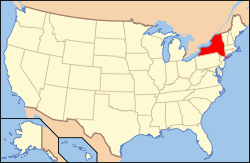Rose Hill Mansion
Rose Hill Mansion is a historic house museum on New York State Route 96A in Fayette, New York. Built in 1837 on a site overlooking Seneca Lake, it is one of the nation's finest examples of monumental residential Greek Revival architecture. The property was declared a National Historic Landmark in 1986.[2][3] It is now owned and operated by the Geneva Historical Society, and is open for tours in the warmer months.
Rose Hill | |
| Location | 3373 NY 96A, Fayette, New York |
|---|---|
| Coordinates | 42°51′38″N 76°56′9″W |
| Area | 23 acres (9.3 ha) |
| Built | 1839 |
| Architect | Unknown |
| Architectural style | Greek Revival |
| NRHP reference No. | 73001269 |
| Significant dates | |
| Added to NRHP | February 06, 1973[1] |
| Designated NHL | June 24, 1986 [2] |
Description and history
Rose Hill is located in northwestern Fayette, on the east side of NY 96A overlooking Seneca Lake to the west. It is on 23 acres (9.3 ha) of land, a small remnant of the much larger 19th-century farm it was once part of. It is a large 2-1/2 story wood frame structure, whose most prominent feature is its main facade, which resembles a Greek temple with six Ionic columns supporting a fully pedimented gable. The central block is flanked by single-story wings, whose two-bay facades are fronted by Ionic colonnades. The wings are recessed from the main facade in front, but extend further to the rear, giving the building an overall U shape. The interior exhibits fine Greek Revival woodwork, with a spiral staircase in the central hall, and an elaborate archway separating the two parlors. The plasterwork is as fine as the woodwork, with major examples derived from the published works of architect Minard Lafever.[3]
The property was first developed as a farm in 1802 by Robert Rose, who moved to the area from Virginia. In 1839, William K. Strong, a New York City businessman, purchased the property and had the mansion house built. Its architect is not known, but its stylistic details suggest that the builders were influenced by the published works of both Minard Lafever and Andrew Jackson Downing, both proponents of the Greek Revival. The property was purchased in 1850 by Benjamin Swan, another New York City businessman, as a wedding present for his son Robert Swan. The Swans operated the property as a farm which was highly regarded for its performance. The property declined after Robert Swan's death in 1890.[3]
In 1965 it was given to the Geneva Historical Society. In poor condition, it underwent an extensive restoration, and was endowed by one of Swan's grandsons to support its future care.[3]
The property is open for tours from May to October.
See also
References
- "National Register Information System". National Register of Historic Places. National Park Service. April 15, 2008.
- "Rose Hill". National Historic Landmark summary listing. National Park Service. 2007-09-18. Archived from the original on 2011-06-06.
- Carolyn Pitts (undated, perhaps 1983), National Register of Historic Places Inventory-Nomination: Rose Hill Mansion (pdf), National Park Service Check date values in:
|date=(help) and Accompanying 6 photos, from 1962, c.1975, and c.1980. (1.25 MB)
External links
| Wikimedia Commons has media related to Rose Hill Mansion (Geneva, NY). |
- Official site: Rose Hill Mansion, at Geneva Historical Society
- Rose Hill, Geneva vicinity: 3 photos and captions, at Historic American Buildings Survey
- Rose Hill Mansion (photo gallery)
- Rose Hill Mansion, Geneva NY: An Architectural Gem

